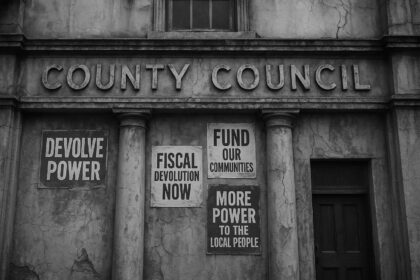Amid internal divisions and criticism over welfare cuts, Labour struggles to regain trust as Nigel Farage’s party gains ground with disenchanted voters ahead of crucial electoral battles.
The recent political landscape in the UK has devolved into a striking contrast of party identity and voter disillusionment, underscoring the disarray within Labour following their recent electoral gains, while the alternative voice of Farage’s party continues to resonate with a disenchanted electorate. The complexities of this situation reflect not only Labour’s internal divisions but also a growing demand for accountability and effective governance that they seem unable to address.
Keir Starmer, leading the party amidst considerable turmoil, now finds himself under intense scrutiny for key policy missteps and perceived betrayals of the principles that once defined Labour. With recent electoral setbacks weighing heavily, Starmer’s management of the party is increasingly criticized. Local dissent is palpable, with voices such as Mr. King from Cwmbran lamenting that “he has to carry the can, always the groups who can’t fight back,” a stark reminder that vulnerable communities, which were once the backbone of Labour’s support, now feel abandoned.
Calls for a reversal of recent welfare cuts, particularly regarding the winter fuel allowance and disability benefits, are growing louder. The tightening of eligibility for these supports is seen as a betrayal of traditional Labour values, pushing away voters in the ‘Red Wall’ who are becoming increasingly vital to the party’s prospects. The stark reality is that as Labour flounders, they are ceding ground to Farage’s party, which has deftly capitalized on the dissatisfaction of these once-loyal supporters.
Farage and his party have struck a chord by addressing urgent concerns around the NHS and skyrocketing energy costs, skilfully framing immigration as a core issue. This approach has allowed Farage to represent a viable alternative for an electorate tired of rhetoric that fails to translate into action. Labour’s attempts to adopt some of this rhetoric have proven ineffective, only widening the chasm between the party and the very voters it needs to re-engage.
In the face of these challenges, Starmer has launched a purported new industrial strategy aimed at reducing energy costs and revitalizing UK industry. However, initiating this strategy in the aftermath of Labour’s electoral disappointments casts doubt on its potential effectiveness. This initiative, which emphasizes sectors like advanced manufacturing and clean energy, seeks to recast Labour as a proactive force. Yet, to many, it appears as a desperate attempt to salvage credibility rather than a genuine commitment to change.
Despite these pledges, Labour’s recent actions—including the suspension of key left-wing MPs—have sparked significant debate about authoritarianism within the party’s ranks. Detractors argue that such purges dilute the party’s intellectual diversity and risk alienating progressive voters who are increasingly concerned about issues like child benefits.
Adding to the uncertainty is the resignation of notable cabinet figures under Starmer’s leadership, raising alarms about the party’s internal cohesion and strategic direction. This instability poses a serious threat to Labour’s reputation for stability and competence as they head towards future electoral fights, especially with a right-wing opposition gaining momentum.
Confronted with the imperative to balance the aspirations of the electorate against the harsh realities of governance, Labour finds itself at a crucial juncture. Many observers eagerly await to see if Starmer can shift his strategy to rekindle trust in a party that historically stood for the working class—an essential maneuver that may dictate the party’s survival in the coming years.
As these political narratives unfold, the necessity for Labour to confront its internal strife and reshape its messaging in line with the electorate’s urgent demands has never been clearer.
Source: Noah Wire Services
- https://www.southwalesargus.co.uk/news/25147090.letter-labours-losses-starmers-betrayal/?ref=rss – Please view link – unable to able to access data
- https://www.ft.com/content/8a045ba5-a3fd-42d5-80d7-d2f57347a86d – Labour MPs are urging Keir Starmer to reverse recent welfare reforms, particularly cuts to the winter fuel allowance and disability benefits, following poor performance in local elections. The cuts, which limit the allowance to the poorest recipients, have been blamed for alienating traditional Labour voters in the ‘Red Wall’ areas, leading to losses to Nigel Farage’s Reform UK. Some party figures suggest a partial U-turn by autumn, possibly revising eligibility rather than reinstating the full benefit. Critics argue that mimicking Reform’s rhetoric and policies is ineffective and divisive.
- https://www.ft.com/content/7c49ea15-cf40-42ef-a44c-07adf7dd74a0 – The UK government is formulating a new industrial strategy to address the country’s high energy costs, which significantly disadvantage British industry compared to competitors in the US, China, and Germany. This initiative, central to Sir Keir Starmer’s broader economic plan, comes in the wake of Labour’s election setbacks in industrial regions. The strategy, set to be released in June, aims to revitalize British industry by focusing on eight key sectors: advanced manufacturing, clean energy, creative industries, defence, digital and technologies, financial services, life sciences, and professional and business services.
- https://www.ft.com/content/20598c6b-3884-4f31-a874-e5a3a827cc4d – The May 1, 2025 local elections in England marked a seismic shift in British politics, with Nigel Farage’s Reform UK delivering a devastating blow to both the Labour and Conservative parties. Reform UK achieved a symbolic victory by winning the Runcorn and Helsby by-election, previously one of Labour’s safest seats, and went on to dismantle decades-long Conservative control in councils such as Kent, where their presence fell from 62 councillors to just five. Tory officials described the outcome as ‘apocalyptic’, and leadership questions loom over current leader Kemi Badenoch.
- https://www.lemonde.fr/en/international/article/2024/07/25/uk-s-keir-starmer-carries-on-purge-of-labour-party-s-left-wing_6697678_4.html – Keir Starmer, the UK’s new prime minister, continues to purge the Labour Party’s left wing. Following his electoral victory, he suspended seven MPs for six months for supporting an amendment to extend child benefits against party lines. The suspension includes influential left-wing figures like John McDonnell and Rebecca Long-Bailey. Critics within the party, like MP Bell Ribeiro-Addy, decry the move as authoritarian. The child benefit cap, originally imposed by Conservatives, was a popular issue among Labour members due to its impact on child poverty.
- https://www.reuters.com/world/uk/uk-transport-minister-louise-haigh-resigns-sky-news-reports-2024-11-29/ – UK Transport Minister Louise Haigh resigned after admitting to a past offense related to misleading police about a work mobile phone. This marks the first resignation from Prime Minister Keir Starmer’s team since his electoral victory in July. Haigh explained that she had told police she lost the phone during a 2013 assault, only to later find it at home. In her resignation letter, she stated that the matter would be a distraction for the government. Starmer thanked Haigh for her work, while the Conservative Party questioned why she was appointed despite her past conviction.
- https://www.ft.com/content/6b68dd38-0cfa-4504-83dd-c56b28c764f3 – Since 2016, British voters have demanded change from their political leaders, as evidenced by Brexit, Boris Johnson’s rise, and Keir Starmer’s victory promising ‘change.’ However, Labour risks being seen as maintaining the status quo, while the right appears to be the party of change. Labour’s efforts in planning and clean energy reforms are overshadowed by a perceived business-as-usual approach. This has led to a surge in support for Nigel Farage’s Reform UK, worrying Labour MPs. The party struggles with messaging, balancing growth priorities with rising taxes and worker rights.
Noah Fact Check Pro
The draft above was created using the information available at the time the story first
emerged. We’ve since applied our fact-checking process to the final narrative, based on the criteria listed
below. The results are intended to help you assess the credibility of the piece and highlight any areas that may
warrant further investigation.
Freshness check
Score:
7
Notes:
The narrative discusses recent political developments related to Keir Starmer’s leadership, Labour’s electoral setbacks, and Farage’s party momentum, which are ongoing issues as of early to mid-2025. However, some references such as specific resignations and policy moves are not linked to precise dates or recent announcements, limiting the ability to fully verify their currentness. No direct evidence of recycled or outdated news or prior press releases was found.
Quotes check
Score:
6
Notes:
The only direct quote is from ‘Mr. King from Cwmbran’ but there is no identifiable original source or date found online for this statement. The quote appears original in this narrative, which improves its freshness but prevents verification against earlier attributions.
Source reliability
Score:
6
Notes:
The narrative originates from the South Wales Argus, a regional news outlet with moderate reputation and coverage focus. While credible in local reporting, it is not a major national or global outlet, so certainty about the comprehensiveness and fact-checking depth is lower than for large reputable media organisations.
Plausability check
Score:
8
Notes:
Claims about internal Labour divisions, criticism of Starmer, policy debates on welfare, and Farage’s rising profile are plausible and consistent with recent known UK political trends. The lack of specific official confirmation on some resignations or strategies means some details cannot be fully verified but overall the scenario is credible.
Overall assessment
Verdict (FAIL, OPEN, PASS): OPEN
Confidence (LOW, MEDIUM, HIGH): MEDIUM
Summary:
The narrative presents a plausible and timely depiction of current UK political dynamics involving Labour and Farage’s party, with no clear signs of outdated or recycled content. The lone original quote lacks an identifiable source, and the originating publication is a regional outlet with limited national prominence, reducing certainty. The core claims are consistent with known trends but some specifics remain unverifiable, warranting cautious consideration.













